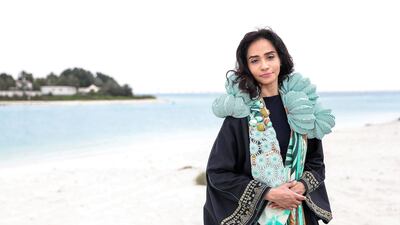Heba Al Fazari had already been a civil engineer, a diplomat and an image consultant when she decided on her current business path 18 months ago.
The uber-stylish 37-year-old Emirati points to the jumper-style black dress she is wearing, bought from a Japanese designer called Limi feu, which she found in the corner of a Tokyo department store. The item not only still gets a lot of compliments – but represents a turning point.
“Every time I’m asked ‘where did you get this’, I say ‘it’s from Japan but I don’t even know how to buy it anymore’,” she says.
The brand wasn’t online, and the department store’s website was entirely in Japanese with no translation.
“I wanted to go back to the website and buy something but I couldn’t find them,” she says. “Maybe it was there, but I will never know.”
That was the beginning of her fashion start-up Coveti.com, which launched in March. But this is no Net-a-porter wannabe. Instead the 12 brands currently on offer – 10 more are in the immediate pipeline – have a specific set of criteria: they must be directional, emerging designers, new-to-the-UAE, and have been carefully curated from Ms Al Fazari’s own extensive travels.
So far there are men’s and women’s shoes, jewellery and accessories, with plans to add clothing soon. As for the business model, when customers buy a bag from Spain and one from Paris through Coveti.com, they will be charged one flat fee and have them shipped straight from the stores.
Ms Al Fazari’s penchant for clothes that are original, with flair, that might be purchased in small boutiques on trendy streets in London or Toronto – but never on the high street – spurred her own frustration at the lack of that preferred apparel niche locally.
“Things are not available in the UAE,” she explains. “I cannot get whatever I want at a good price. Either I buy Dior and Chanel, which is not in my disposable income for everyday wear, or I just buy Mango and Zara and it’s really, really boring.”
Ms Al Fazari first ventured into online fashion after a trip to Bangalore in 2013 while earning her MBA at Georgetown University in Washington. After leaving her suitcase behind, she realised she needed garments and was appalled at the poor quality and terrible design on offer. The website she subsequently launched in India has since been closed, due to a change in business laws, but it served as a precursor for Coveti.com.
The idea was, Ms Al Fazari says: “If I need it, I’m sure other people will need it too.”
_______________
Read more:
Ingie Chalhoub: the Middle East's fashion powerhouse
Asian retail start-up founded by young female entrepreneur scores $54m funding
_______________
The entrepreneur has big plans for Coveti.com to be much more than an online boutique for her international fashion finds. Soon she will showcase emerging local designers, from the UAE and Mena region.
Within two months she aims to launch another section of the website where customers can fully customise their orders, starting with men’s shoes and expanding to other items. Her plans are to offer this service to help smaller designers produce their work for sale to the public, as well.
Currently Ms Al Fazari charges designers 20 to 45 per cent on international orders, a sliding scale depending on whether they take advantage of her marketing and social media services.
Then there is the “Get Inspired” social commerce section of the site, which uses technology that grabs all social media related to the brands Coveti.com sells. That means instead of a traditional gallery, the website can, with permission, feature an assortment of images including Solange Knowles in action wearing its Carla Lopez circular Jirafa pouch – with a link right back to the section where customers can buy it.
“It’s basically user-generated content,” says Ms Al Fazari. “We go and collect all this data around the globe and we showcase it in the right touchpoint at the right moment so you will buy.”
It’s not easy launching a fashion start-up in the UAE, Ms Al Fazari says. The bureacracy can be daunting and inflexible – some licenses require vast amounts of storage, for example, which a website like Coveti.com does not need. And costs can be prohibitive, particularly for technology, which she outsources to India.
There two developers and a designer who help mould and shape Coveti.com into what Ms Al Fazari hopes will be the best, fastest customer experience possible. The staff costs are about US$1,700 (Dh6,243) per month, compared with the Dh30,000 she would be likely to have to pay in the UAE.
Ms Al Fazari feels the key to her company’s success will be in having a business model that moves like “water in a pipe – one way”.
“With other traditional, wholesale retailers, they have the working-capital risk, they have the rental risk, they have the warehousing risk and on top of that the inventory risk,” she says.
“We don’t have any of that stuff. We have a digital platform to connect A to B.”

